Ukraine government quits in concession to protesters
It is not clear who could succeed Azarov as prime minister.
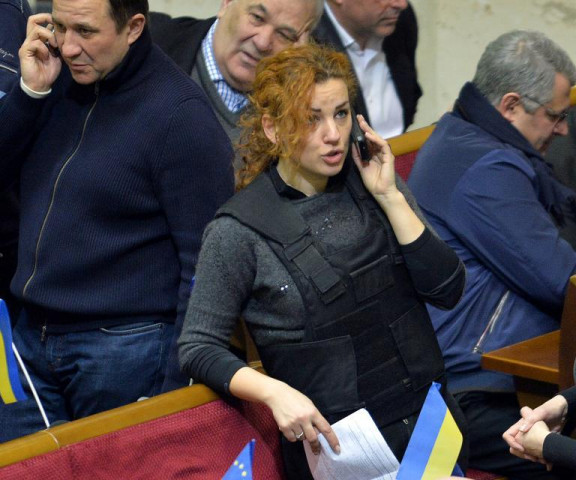
Ukrainian opposition deputy Lesya Orobyets wears a bulletproof vest during an extraordinary parliamentary session in Kiev, on January 28, 2014 PHOTO: AFP
Ukraine also dominated an EU-Russia summit in Brussels at which Russian President Vladimir Putin struck a conciliatory tone, saying he would not revise the terms of a bailout for Kiev even if the opposition came to power.
Giving in to opposition pressure and protests that have spread far beyond Kiev, Ukrainian Prime Minister Mykola Azarov said he was quitting to preserve the unity of the country.
Azarov will be replaced in an interim capacity by deputy prime minister Sergiy Arbuzov, a felllow Yanukovych loyalist, while other ministers will stay on until a new cabinet is named.
It is not clear who could succeed Azarov as prime minister, although some analysts floated the idea that a pro-opposition tycoon, Petro Poroshenko, might step into the post.
World boxing champion and opposition leader Vitali Klitschko said the announcement of Azarov and the government's resignation was "not victory but a step to victory".
Parliament also on Tuesday overwhelmingly voted to repeal the same contentious anti-protest laws it had approved just two weeks ago, a move that had re-ignited the crisis.
Only two lawmakers voted against the motion, with 361 voting in favour -- including all of Yanukovych's Regions Party MPs -- and the reform was passed to applause from opposition benches.
Yet the dramatic twists do not spell an end to Ukraine's crisis as two central opposition demands -- the release of jailed protesters and early elections -- remain unresolved.
Lawmakers are to gather again on Wednesday to debate the release of scores of protesters.
The presidency earlier said it wanted to make the amnesty conditional on protesters vacating official buildings they have seized and occupied and taking down their barricades.
The opposition has ruled this out and wants Yanukovych to bring forward to this year a presidential election scheduled for early 2015.
"We are here so that the president also resigns to change the system of power in the country," said Vasyl, 49, from the Ivano-Frankivsk region of western Ukraine, one of the protesters camped out with thousands of others on Independence Square in central Kiev.
"People went out on the streets because they could not stand this president any more."
Militants remain camped out in the sprawling military-style enclosure that has taken over much of the city centre and is surrounded by barbed wire and barricades topped with pikes.
Groups of protesters wearing motorbike helmets and wielding baseball bats can be seen patrolling several streets in the capital.
But there has been no significant violence in Kiev in recent days, following clashes last week between protesters and riot police that left three activists dead.
Jailed former prime minister Yulia Tymoshenko, said Tuesday's concessions were the "first real result from the fight of people who took to the streets".
But she added: "It is not enough. Do not stop!"
EU foreign policy chief Catherine Ashton brought forward a visit to Kiev by several days and is expected to arrive late Tuesday after attending the Brussels summit with Putin.
In an apparent reference to the build-up of pressure on Yanukovych from the West, Putin on Tuesday warned that "the more intermediaries there are, the more problems there are" adding: "Russia will never interfere".
The Kremlin leader also emphasised that Russia "will not" review its $15-billion (11-billion-euro) bailout for Ukraine whoever is in charge in Kiev -- a relief for the economy which is hugely reliant on the credit.
There is still a lot of concern for Ukraine on the economic front, however, and Standard & Poor's also Tuesday downgraded Ukraine's credit risk rating by one notch to CCC+ from B-, citing political instability.
Western leaders were cautious, with German Foreign Minister Frank-Walter Steinmeier saying he hoped Azarov's resignation was a "signal" for further dialogue.
Swedish Foreign Minister Carl Bildt, a prominent critic of Yanukovych's actions, said on Twitter he "warmly welcomed" the moves by parliament and was hoping for more steps.
Canada, which has a large Ukrainian minority, praised the courage of protesters and on Tuesday said it would refuse entry to any government officials linked to the crackdown.
The protests began in November as a drive for EU integration after Yanukovych under Russian pressure ditched a key deal with the bloc.
They have since snowballed into a wider movement against his rule, spreading into his heartland in the mostly Russian-speaking east.

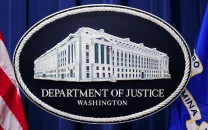

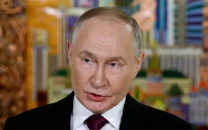
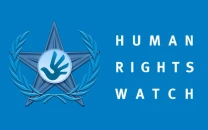
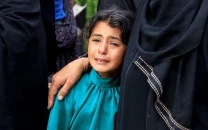
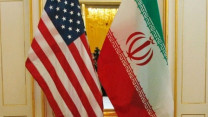












COMMENTS
Comments are moderated and generally will be posted if they are on-topic and not abusive.
For more information, please see our Comments FAQ